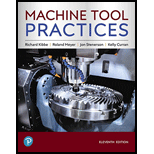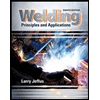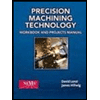
EBK MACHINE TOOL PRACTICES
11th Edition
ISBN: 9780134985824
Author: CURRAN
Publisher: VST
expand_more
expand_more
format_list_bulleted
Textbook Question
Chapter C.7, Problem 1ST
What is a wringing interval?
Expert Solution & Answer
Want to see the full answer?
Check out a sample textbook solution
Students have asked these similar questions
For the position shown in the figure the spring is unstretched. The spring constant k, is designed such that after the system is released from rest, the speed of the mass is zero just as the 0.6 slug mass touches the floor. Find the spring constant, k and the maximum speed of block A and the location (distance above floor) where this occurs.
||!
Sign in
MMB241 - Tutorial L9.pd X PDF MMB241 - Tutorial L10.pX DE MMB241 - Tutorial L11.p x PDF Lecture W12 - Work and X
File C:/Users/KHULEKANI/Desktop/mmb241/MMB241%20-%20Tutorial%20L11.pdf
PDE Lecture W11 - Power and X
Draw
Alla | Ask Copilot
++
3
of 3
| D
6. If the 50-kg load A is hoisted by motor M so that the load has a constant velocity of 1.5
m/s, determine the power input to the motor, which operates at an efficiency € = 0.8.
1.5 m/s
2
7. The sports car has a mass of 2.3 Mg, and while it is traveling at 28 m/s the driver causes
it to accelerate at 5m/s². If the drag resistance on the car due to the wind is FD= 0.3v²N,
where v is the velocity in m/s, determine the power supplied to the engine at this instant.
The engine has a running efficiency of P = 0.68.
8. If the jet on the dragster supplies a constant thrust of T-20 kN, determine the power
generated by the jet as a function of time. Neglect drag and rolling resistance, and the loss
of fuel. The dragster has a mass of 1…
Q |
Sign in
PDE Lecture W09.pdf
PDF MMB241 - Tutorial L9.pdi X
PDF MMB241 - Tutorial L10.p X
PDF
MMB241 - Tutorial L11.p X
Lecture W12-Work and X
+
File C:/Users/KHULEKANI/Desktop/mmb241/Lecture%20W12%20-%20Work%20and%20Energy.pdf
||!
Draw
| IA | a | Ask Copilot
Class Work
+
33
of 34 D
Question 1
The engine of a 3500-N car is generating a constant power of 50 hp (horsepower)
while the car is traveling up the slope with a constant speed. If the engine is
operating with an efficiency of € 0.8, determine the speed of the car. Neglect
drag and rolling resistance. Use g 9.81 m/s² and 1 hp = 745.7 W.
10
го
Question 2
A man pushes on a 60-N crate with a force F. The force is always directed downward at an angle of 30°
from the horizontal, as shown in the figure. The magnitude of the force is gradually increased until the crate
begins to slide. Determine the crate's initial acceleration once it starts to move. Assume the coefficient of
static friction is μ = 0.6, the coefficient of kinetic…
Chapter C Solutions
EBK MACHINE TOOL PRACTICES
Ch. C.1 - Prob. 1STCh. C.1 - Prob. 2STCh. C.1 - Prob. 3STCh. C.1 - Prob. 4STCh. C.1 - Prob. 5STCh. C.1 - Prob. 6STCh. C.1 - Prob. 7STCh. C.1 - Prob. 8STCh. C.1 - Prob. 9STCh. C.1 - Prob. 10ST
Ch. C.2 - Prob. 1STCh. C.2 - Prob. 2STCh. C.2 - Prob. 3STCh. C.2 - Prob. 4STCh. C.2 - Prob. 5STCh. C.2 - Prob. 6STCh. C.2 - Prob. 7STCh. C.2 - Prob. 8STCh. C.2 - Prob. 9STCh. C.2 - Can an inch machine tool be converted to work in...Ch. C.3 - Prob. 1.1STCh. C.3 - Prob. 1.2STCh. C.3 - Prob. 1.3STCh. C.4 - Prob. 1.1STCh. C.4 - Prob. 1.2STCh. C.4 - Prob. 1.3STCh. C.5 - Prob. 1STCh. C.5 - Prob. 2STCh. C.5 - Prob. 3STCh. C.5 - Prob. 4STCh. C.5 - Prob. 5STCh. C.5 - Prob. 6STCh. C.5 - Prob. 7STCh. C.5 - Prob. 8STCh. C.5 - Prob. 9STCh. C.5 - Prob. 10STCh. C.5 - Prob. 11STCh. C.5 - Prob. 1.1STCh. C.5 - Prob. 1.2STCh. C.5 - Prob. 2.1STCh. C.5 - Prob. 3.1STCh. C.5 - Prob. 4.1STCh. C.6 - What is comparison measurement?Ch. C.6 - Define cosine error.Ch. C.6 - Prob. 3STCh. C.6 - Prob. 4STCh. C.6 - Prob. 5STCh. C.6 - Prob. 6STCh. C.6 - Prob. 7STCh. C.6 - Prob. 8STCh. C.7 - What is a wringing interval?Ch. C.7 - Why are wear blocks frequently used in combination...Ch. C.7 - As related to gage block use, what is meant by the...Ch. C.7 - Prob. 4STCh. C.7 - What is a conditioning stone and how is it used?Ch. C.7 - Prob. 6STCh. C.7 - Prob. 7STCh. C.7 - Prob. 8STCh. C.7 - Prob. 9STCh. C.7 - Prob. 10STCh. C.8 - Name two angular measuring instruments with one...Ch. C.8 - What is the discrimination of the universal bevel...Ch. C.8 - Describe the use of the sine bar.Ch. C.8 - Prob. 4STCh. C.8 - Calculate the required sine bar elevation for an...Ch. C.8 - A 10-inch sine bar is elevated 2.750 inch....Ch. C.8 - How do 10-inch and 5-inch sine bars affect the...Ch. C.8 - What gage block stack would establish an angle of...Ch. C.8 - What gage block stack would establish an angle of...Ch. C.8 - A 10-inch bar is elevated 2.5 inch. What angle is...Ch. C.9 - Prob. 1STCh. C.9 - Prob. 2STCh. C.9 - Prob. 3STCh. C.9 - Prob. 4STCh. C.9 - Prob. 5STCh. C.9 - Prob. 6STCh. C.9 - Prob. 7STCh. C.9 - Prob. 8STCh. C.9 - Prob. 9STCh. C.9 - Prob. 10STCh. C.9 - Prob. 11STCh. C.9 - Prob. 12STCh. C.9 - Prob. 13STCh. C.9 - Prob. 14STCh. C.9 - Prob. 15STCh. C.9 - Prob. 16STCh. C.9 - Prob. 17STCh. C.9 - Prob. 18STCh. C.9 - Prob. 19STCh. C.9 - Prob. 20STCh. C.9 - Prob. 21STCh. C.9 - Prob. 22STCh. C.9 - Prob. 23STCh. C.9 - Prob. 24STCh. C.9 - Prob. 25STCh. C.9 - Prob. 26STCh. C.9 - Prob. 27STCh. C.9 - Prob. 28STCh. C.9 - Prob. 29STCh. C.9 - Prob. 30STCh. C.9 - Prob. 31STCh. C.9 - Prob. 32STCh. C.9 - Prob. 33STCh. C.9 - Prob. 34STCh. C.10 - Prob. 1STCh. C.10 - Prob. 2STCh. C.10 - Prob. 3STCh. C.10 - Prob. 4STCh. C.10 - Prob. 5STCh. C.10 - Prob. 6STCh. C.10 - Prob. 7STCh. C.10 - Prob. 8STCh. C.10 - Prob. 9ST
Knowledge Booster
Learn more about
Need a deep-dive on the concept behind this application? Look no further. Learn more about this topic, mechanical-engineering and related others by exploring similar questions and additional content below.Similar questions
- state is Derive an expression for the volume expansivity of a substance whose equation of RT P = v-b a v(v + b)TZ where a and b are empirical constants.arrow_forwardFor a gas whose equation of state is P(v-b)=RT, the specified heat difference Cp-Cv is equal to which of the following (show all work): (a) R (b) R-b (c) R+b (d) 0 (e) R(1+v/b)arrow_forwardof state is Derive an expression for the specific heat difference of a substance whose equation RT P = v-b a v(v + b)TZ where a and b are empirical constants.arrow_forward
- Temperature may alternatively be defined as T = ди v Prove that this definition reduces the net entropy change of two constant-volume systems filled with simple compressible substances to zero as the two systems approach thermal equilibrium.arrow_forwardUsing the Maxwell relations, determine a relation for equation of state is (P-a/v²) (v−b) = RT. Os for a gas whose av Tarrow_forward(◉ Homework#8arrow_forwardHomework#8arrow_forwardBox A has a mass of 15 kilograms and is attached to the 20 kilogram Box B using the cord and pulley system shown. The coefficient of kinetic friction between the boxes and surface is 0.2 and the moment of inertia of the pulley is 0.5 kg * m^ 2. After 2 seconds, how far do the boxes move? A бро Barrow_forwardBox A has a mass of 15 kilograms and is attached to the 20 kilogram Box B using the cord and pulley system shown. The coefficient of kinetic friction between the boxes and surface is 0.2 and the moment of inertia of the pulley is 0.5 kg * m^2. Both boxes are 0.25 m long and 0.25 m high. The cord is attached to the bottom of Box A and the middle of box B. After 2 seconds, how far do the boxes move? A From бро Barrow_forwardHomework#8arrow_forwardSign in PDF Lecture W09.pdf PDF MMB241 - Tutorial L9.pdf File C:/Users/KHULEKANI/Desktop/mmb241/MMB241%20-%20Tutorial%20L9.pdf II! Draw | I│Alla | Ask Copilot + of 4 D Topic: Kinetics of Particles: - Forces in dynamic system, Free body diagram, newton's laws of motion, and equations of motion. TQ1. The 10-kg block is subjected to the forces shown. In each case, determine its velocity when t=2s if v 0 when t=0 500 N F = (201) N 300 N (b) TQ2. The 10-kg block is subjected to the forces shown. In each case, determine its velocity at s-8 m if v = 3 m/s at s=0. Motion occurs to the right. 40 N F = (2.5 s) N 200 N 30 N (b) TQ3. Determine the initial acceleration of the 10-kg smooth collar. The spring has an unstretched length of 1 m. 1 σ Q ☆ Q 6 ا الى ☑arrow_forwardSign in PDF Lecture W09.pdf PDF MMB241 - Tutorial L9.pdf File C:/Users/KHULEKANI/Desktop/mmb241/MMB241%20-%20Tutorial%20L9.pdf II! Draw | I│Alla | Ask Copilot + 4 of 4 | D TQ9. If motor M exerts a force of F (10t 2 + 100) N determine the velocity of the 25-kg crate when t kinetic friction between the crate and the plane are μs The crate is initially at rest. on the cable, where t is in seconds, 4s. The coefficients of static and 0.3 and μk = 0.25, respectively. M 3 TQ10. The spring has a stiffness k = 200 N/m and is unstretched when the 25-kg block is at A. Determine the acceleration of the block when s = 0.4 m. The contact surface between the block and the plane is smooth. 0.3 m F= 100 N F= 100 N k = 200 N/m σ Q Q ☆ ا الى 6 ☑arrow_forwardarrow_back_iosSEE MORE QUESTIONSarrow_forward_iosRecommended textbooks for you
 Welding: Principles and Applications (MindTap Cou...Mechanical EngineeringISBN:9781305494695Author:Larry JeffusPublisher:Cengage Learning
Welding: Principles and Applications (MindTap Cou...Mechanical EngineeringISBN:9781305494695Author:Larry JeffusPublisher:Cengage Learning Refrigeration and Air Conditioning Technology (Mi...Mechanical EngineeringISBN:9781305578296Author:John Tomczyk, Eugene Silberstein, Bill Whitman, Bill JohnsonPublisher:Cengage Learning
Refrigeration and Air Conditioning Technology (Mi...Mechanical EngineeringISBN:9781305578296Author:John Tomczyk, Eugene Silberstein, Bill Whitman, Bill JohnsonPublisher:Cengage Learning Precision Machining Technology (MindTap Course Li...Mechanical EngineeringISBN:9781285444543Author:Peter J. Hoffman, Eric S. Hopewell, Brian JanesPublisher:Cengage Learning
Precision Machining Technology (MindTap Course Li...Mechanical EngineeringISBN:9781285444543Author:Peter J. Hoffman, Eric S. Hopewell, Brian JanesPublisher:Cengage Learning
 Welding: Principles and Applications (MindTap Cou...Mechanical EngineeringISBN:9781305494695Author:Larry JeffusPublisher:Cengage Learning
Welding: Principles and Applications (MindTap Cou...Mechanical EngineeringISBN:9781305494695Author:Larry JeffusPublisher:Cengage Learning Refrigeration and Air Conditioning Technology (Mi...Mechanical EngineeringISBN:9781305578296Author:John Tomczyk, Eugene Silberstein, Bill Whitman, Bill JohnsonPublisher:Cengage Learning
Refrigeration and Air Conditioning Technology (Mi...Mechanical EngineeringISBN:9781305578296Author:John Tomczyk, Eugene Silberstein, Bill Whitman, Bill JohnsonPublisher:Cengage Learning Precision Machining Technology (MindTap Course Li...Mechanical EngineeringISBN:9781285444543Author:Peter J. Hoffman, Eric S. Hopewell, Brian JanesPublisher:Cengage Learning
Precision Machining Technology (MindTap Course Li...Mechanical EngineeringISBN:9781285444543Author:Peter J. Hoffman, Eric S. Hopewell, Brian JanesPublisher:Cengage Learning
Differences between Temporary Joining and Permanent Joining.; Author: Academic Gain Tutorials;https://www.youtube.com/watch?v=PTr8QZhgXyg;License: Standard Youtube License